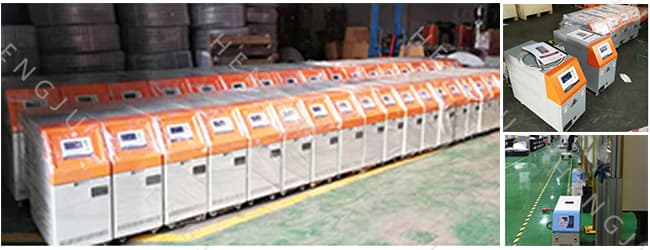When selecting a mold temperature controller for the injection molding industry, a key decision involves comparing water-based mold temperature controllers with oil-based ones. Here are some suggestions on how to choose:

1. Temperature Control Requirements
- Water-based Mold Temperature Controllers: Suitable for lower temperature applications, typically operating within the range of 100°C to 200°C. Water-based controllers heat up quickly and are suitable for applications sensitive to temperature changes.
- Oil-based Mold Temperature Controllers: Suitable for higher temperature applications, reaching temperatures of 300°C and above. Oil-based controllers can provide stable high-temperature control, ideal for processing high-melting-point plastics or specialized applications.
2. System Stability and Control Accuracy
- Water-based Mold Temperature Controllers: High control accuracy with fast response times, suitable for production lines requiring precise temperature control.
- Oil-based Mold Temperature Controllers: Excellent stability and heat transfer capabilities, able to maintain stable temperatures in high-temperature environments, suitable for demanding high-temperature plastic molding.
3. Energy Efficiency and Operating Costs
- Water-based Mold Temperature Controllers: Generally lower energy consumption, suitable for most general injection molding applications, with relatively lower maintenance costs.
- Oil-based Mold Temperature Controllers: Higher energy consumption due to operation at high temperatures. Maintenance costs for oil-based controllers may also be higher, requiring regular checks and lubricant changes.
4. Material Compatibility and Environmental Safety
- Water-based Mold Temperature Controllers: More environmentally friendly, producing no harmful gases, and easy to handle wastewater.
- Oil-based Mold Temperature Controllers: More compatible when processing special materials, but the lubricants used may have environmental impacts, requiring careful handling and recycling.
5. Application Fields and Requirements
- Water-based Mold Temperature Controllers: Suitable for most conventional injection molding applications, such as household items and plastic packaging.
- Oil-based Mold Temperature Controllers: Suitable for high-temperature plastic molding applications, such as automotive parts and electronic product casings.
Conclusion
In summary, the choice between water-based and oil-based mold temperature controllers depends on your specific requirements. If you need higher temperature control and stability, especially for molding high-temperature plastics, oil-based controllers may be more suitable. For general injection molding production lines, water-based controllers could be a more economical and environmentally friendly choice. Before making a final decision, be sure to carefully consider your production needs, budget, and environmental requirements.


